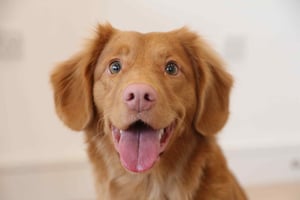Training your dog can be a challenging and time-consuming process. One of the most important tools...
Food Aggression in Puppies: How to Stop It
Food aggression in puppies is a common problem that can be easily managed with proper training. If left unchecked, it can lead to more serious behavioral issues. In this article, we will discuss the causes of food aggression in puppies, how to recognize it, and the best methods to stop it. We will also provide tips on how to prevent food aggression from developing in the first place.
What Causes Food Aggression in Puppies?
Food aggression in puppies occurs when a puppy is overly protective of its food or treats. This behavior can be caused by several factors, including a lack of socialization, fear, anxiety, or a feeling of insecurity. Puppies may also display food aggression if they feel their food is being taken away from them or if they are competing with other dogs for food.
In some cases, food aggression can be caused by physical pain or discomfort. If your puppy is experiencing pain or discomfort, it may become aggressive when it comes to food, as it may feel threatened or scared.
How to Recognize Food Aggression in Puppies
It is important to recognize the signs of food aggression in puppies so that you can take steps to address the issue. The most common signs of food aggression include growling, barking, snapping, and lunging when someone approaches the food bowl or when treats are being given. Your puppy may also guard its food bowl by standing over it and not allowing anyone to come near it.
In some cases, your puppy may also display signs of food aggression when it is eating from your hand. For example, it may nip or bite when it feels threatened or scared. If your puppy is displaying any of these signs of food aggression, it is important to take action as soon as possible.
How to Stop Food Aggression in Puppies
If your puppy is displaying signs of food aggression, it is important to take steps to address the issue. The most effective way to stop food aggression in puppies is to provide your puppy with positive reinforcement. This involves rewarding your puppy with treats or praise when it displays good behavior while eating.
It is also important to provide your puppy with plenty of socialization and training. This will help your puppy to become more comfortable around other people and dogs, which can help to reduce any feelings of insecurity or fear that may be causing the food aggression.
It is also important to provide your puppy with regular meals and treats. This will help to ensure that your puppy has enough food and that it is not feeling overly hungry or anxious. Regular meals and treats will also help to reduce competition between your puppy and other animals.
Finally, it is important to make sure that your puppy feels safe and secure. If your puppy is feeling insecure or scared, it may become more aggressive when it comes to food. Providing your puppy with a safe and secure environment can help to reduce any feelings of insecurity.
Preventing Food Aggression in Puppies
The best way to prevent food aggression in puppies is to start training and socialization as soon as possible. This will help your puppy to become more comfortable around other people and animals, which can help to reduce any feelings of insecurity or fear. It is also important to provide your puppy with regular meals and treats, as this can help to reduce competition between your puppy and other animals.
It is also important to avoid any situations that may trigger food aggression in your puppy. For example, if your puppy is displaying signs of food aggression when it is eating from your hand, it is important to stop feeding it this way. Instead, try feeding your puppy from a bowl or feeding it in a quiet, calm environment.
Finally, it is important to be aware of any signs of food aggression in your puppy and take steps to address the issue. If your puppy is displaying signs of food aggression, it is important to provide positive reinforcement and to provide your puppy with a safe and secure environment.
Conclusion
Food aggression in puppies is a common issue that can be easily managed with proper training and socialization. It is important to recognize the signs of food aggression in puppies, as this can help you to take steps to address the issue. The most effective way to stop food aggression in puppies is to provide positive reinforcement and to provide your puppy with a safe and secure environment. Finally, it is important to take steps to prevent food aggression from developing in the first place.



